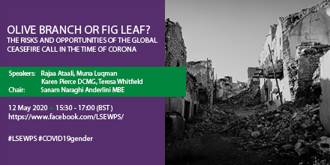
Are the ceasefires taking place and holding? If there is a shift towards political solutions and local conditions, is this not the key opportunity for the full participation of women peacebuilders? What are the risks and opportunities for sustained inclusive processes – both in the virtual space and in real time - in war-affected settings? Could the global ceasefires entrench negative forces? Given women’s peace organisations are among the first responders in the most difficult contexts, what must international actors do to foster their safety and ensure their sustained inclusion in peacemaking and peacebuilding now and in the aftermath of this pandemic?
The impact of the Corona pandemic in countries already wracked by years of war and violent extremism is difficult to fathom. From crowded camps where the lives of refugees and internally displaced populations are at risk, to communities where basic water and sanitation systems, food supplies and already-fragile livelihoods are devastated, the long-term implications of the virus are profound. Recognising this, the UN Secretary General called for a global ceasefire in March to end the destruction, save lives and bring a degree of security that would enable better access for humanitarian and relief services, with 110 states currently signed up to the pledge to-date.
About the speakers:
Siri Aas Rustad @SiriRustadPRIO is a senior researcher at the Peace Research Institute Oslo (PRIO) and a lecturer at the Norwegian University of Life Science.
Rajaa Ataali @Rajaa_Altalli is Co-Founder and Co-Director for Center for Civil Society and Democracy @ccsdsyria.
Muna Luqman @munaluqman is Co-founder of the Women Solidarity Networkand Chairperson of the Yemeni foundation Food For Humanity.
Dame Karen Pierce DCMG @KarenPierceUK is a British diplomat who is currently British Ambassador to the United States at the Foreign and Commonwealth Office, and previously the Permanent Representative of the United Kingdom to the United Nations.
Teresa Whitfield is Director of the Department of Political and Peacebuilding Affairs’ (DPPA @UNDPPA) Policy and Mediation Division in the United Nations.
Chair: Sanam Naraghi Anderlini MBE @sanambna is Director of the LSE Centre for Women, Peace and Security and founder and CEO of the International Civil Society Action Network (ICAN).
This event is hosted by the LSE Centre for Women, Peace and Security and is part of a series of events from the gender, peace and security academic consortium with the Georgetown Institute for Women, Peace and Security, the PRIO Centre on Gender, Peace and Security, Monash Gender, Peace and Security Centre and the Women, Peace and Security Institute in Kofi Annan International Peacekeeping Training Centre.
More information and link to live broadcast here.
GMT+1 (London time) 15:30-17:00 PM
GMT+2 (Oslo time) 16:30-18:00 PM





